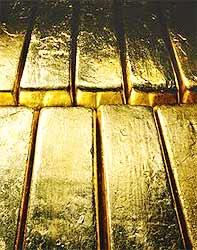
 f you are reading this piece, I can assume you are eager to invest in the noble metal.
f you are reading this piece, I can assume you are eager to invest in the noble metal.
Or at least want to explore the option. No? Then vaguely curious, probably?
But I am not going to suggest jewellery. In fact, I am convinced that jewellery is a bad investment. Definitely a great accessory and an impressive gift (one that will make the ladies swoon). But a wise investment? I don't think so.
So if you want to invest in gold, what do you do?
Simple. Go for the gold bars.
In case you are bringing to mind the Gold Control Act that did not permit individuals to hold gold, let me give you a lesson in history!
After the Indo-China War in 1962 came the Gold Control Act. With it, Indian citizens could no longer own pure gold bars and coins. Only licensed dealers could hold pure gold bars and coins.
In 1992, the Act was scrapped.
So, dear reader, there's nothing to stop you now.
Why a gold bar and not a gold necklace?
One of the main aspects of investment is to look at liquidity. Which means, how fast can I sell my investment without incurring a loss in its value?
Here, a gold bar scores high over jewellery for a number of reasons.
1. Jewellery has higher labour costs
When you buy jewellery, you pay for the design and the intricate work. The better the workmanship, the more you pay. Labour costs in India account for around 15% to 20% of the cost of gold.
Not so in the case of a gold bar. It is just a slab of gold, and you pay only for the weight of the gold. No labour costs involved here. Just the current market rate for gold with a 1% sales tax imposed.
2. You get more value for money when selling a bar
When you resell your jewellery, the jeweller buying it will look at the design, workmanship, weight, purity and current price of gold. If the workmanship is intricate, you may get a better deal. If he considers the design old fashioned and outdated, you won't.
But chances are that he will give you a bad deal. Once again, you do not face such problems when disposing the gold bar. You get the current price. And that's it.
3. Jewellery has higher mark-up costs
That's right. Like shopping for your jewellery in a nice, well-lit store, where staff members in uniform attend to you? Remember, the jeweller wants to make a profit not only over and above his raw material costs, labour costs and insurance, but also cover the rentals, electricity bill and salaries.
Who will bear the brunt? You.
When you sell it, none of this is taken into account. In fact, he won't even consider how much you paid when you bought it.
4. Purity is guaranteed with a bar
I know you regard your family jeweller on the same lines as your family doctor. With one you, trust your money, the other you trust your health.
Don't be so gullible (with the money).
Your jeweller states the jewellery is 18 karat. How do you know that for sure? In India, it is safe to assume that 80% of jewellers sell jewellery with lower karatage than stated. Would you be any wiser?
You look at the piece of jewellery, find a small mark there saying 18k, and you are convinced.
How do you know it is authentic? After all, he could put down any figure he wants. Is it verified?
To be sure of the purity, check whether the jewellery is hallmarked. This means that an independent, government-recognised body has officially evaluated and certified that the jewellery conforms to the purity stated. The Bureau of Indian Standards and the Bullion Exchange are two such bodies in India.
Tomorrow: All about gold bars!




